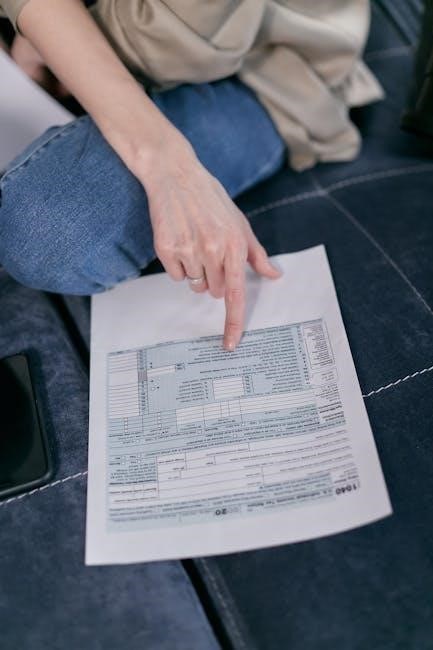Form 7208 is used to report the 1% excise tax on stock repurchases by publicly traded corporations or their affiliates‚ introduced by the Inflation Reduction Act of 2022․
1․1 Overview of IRS Form 7208
Form 7208 is a new IRS form introduced to report the 1% excise tax on stock repurchases by publicly traded corporations or their affiliates‚ effective for repurchases after 2022․ It is specifically designed to calculate and report the tax liability‚ ensuring compliance with the Inflation Reduction Act․ The form is typically attached to Form 720‚ the Quarterly Federal Excise Tax Return‚ and provides detailed line-by-line instructions for accurate reporting and payment․
1․2 Purpose of the Form
Form 7208 is specifically designed to report the 1% excise tax on stock repurchases by publicly traded corporations and their affiliates‚ as mandated by the Inflation Reduction Act of 2022․ Its primary purpose is to ensure accurate reporting and payment of this tax‚ promoting transparency and accountability in corporate financial transactions‚ and to comply with federal tax regulations effectively․
1․3 Key Features and Requirements
Key features of Form 7208 include its role in calculating and reporting the 1% excise tax on stock repurchases․ It requires detailed information about repurchased stock‚ including net value and transaction dates․ The form must be attached to Form 720‚ with submissions typically due annually․ Compliance involves accurate documentation and timely filing to avoid penalties‚ ensuring adherence to IRS guidelines and regulations;

Filing Deadlines for Form 7208
The deadline for filing Form 7208 varies by tax year‚ with specific due dates for periods ending in 2024 and extensions available under IRS guidelines when filed with Form 720․
2․1 General Filing Deadline
The general filing deadline for Form 7208 is tied to the submission of Form 720‚ Quarterly Federal Excise Tax Return․ For taxable years ending after December 31‚ 2022‚ and on or before June 28‚ 2024‚ the due date is October 31‚ 2024․ For taxable years ending after June 28‚ 2024‚ the form must be filed along with Form 720‚ adhering to its standard filing deadline‚ ensuring timely compliance with IRS regulations․
2․2 Special Considerations for Tax Years Ending After December 31‚ 2022
For tax years ending after December 31‚ 2022‚ and on or before June 28‚ 2024‚ the filing deadline for Form 7208 is October 31‚ 2024․ The IRS has not yet issued final regulations‚ so taxpayers should not report or pay the excise tax until further guidance is provided․ However‚ they must maintain detailed records and set aside funds to ensure compliance once regulations are finalized‚ avoiding potential penalties for non-compliance․
2․3 Extension of Time to File
To request an extension for filing Form 7208‚ taxpayers must submit Form 720-X‚ Amended Quarterly Federal Excise Tax Return․ The extended deadline is typically the same as the original Form 720 filing deadline․ However‚ the IRS has not yet issued final regulations‚ so taxpayers should monitor updates and ensure compliance to avoid late filing penalties‚ which may apply if the tax is not reported or paid on time․

Filing Process for Form 7208
Form 7208 must be attached to Form 720‚ Quarterly Federal Excise Tax Return․ Filers can submit electronically or by mail‚ following specific IRS instructions for accuracy․
3․1 Step-by-Step Guide to Filing the Form
To file Form 7208‚ log in to your IRS account or create one․ Enter business details‚ select Form 7208‚ and fill in required information about stock repurchases․ Review the form for accuracy‚ calculate the excise tax‚ and submit electronically or by mail․ Ensure all attachments are included‚ and follow IRS instructions carefully to avoid errors or delays in processing․
3․2 Required Documentation and Attachments
Form 7208 must be attached to Form 720․ Include detailed information about the repurchasing entity‚ dates‚ and amounts of stock repurchases․ Attach supporting documents‚ such as records of stock transactions and calculations of the net value․ Ensure accurate documentation to verify the excise tax calculation and comply with IRS requirements․ Maintain copies of all records for potential audits or further review․
3․3 Electronic Filing Options
Form 7208 can be electronically filed along with Form 720 through IRS-approved platforms․ Use the IRS’s Modernized e-File system or third-party tax software․ Ensure the form is signed digitally and submitted securely․ Maintain digital copies for records‚ as the IRS may request them for verification․ Electronic filing streamlines the process and reduces errors‚ ensuring timely compliance with tax reporting requirements․

Calculating the Excise Tax
The excise tax is calculated as 1% of the net value of repurchased stock‚ applicable to transactions occurring after December 31‚ 2022․ Use Form 7208 to compute the tax․
4․1 Understanding the 1% Excise Tax on Stock Repurchases
The 1% excise tax applies to certain stock repurchases by publicly traded corporations or their affiliates‚ effective for transactions after December 31‚ 2022․ It targets the net value of repurchased shares‚ with specific exceptions․ The tax is non-deductible and must be reported annually using Form 7208‚ ensuring compliance with IRS regulations․
4․2 Determining the Net Value of Repurchased Stock
The net value of repurchased stock is calculated as the fair market value of the shares on the repurchase date‚ minus certain adjustments․ This includes commissions‚ stamps‚ and other fees‚ but excludes amounts reinvested in the corporation․ The IRS requires accurate documentation to support these calculations‚ ensuring compliance with the excise tax reporting requirements on Form 7208․
4․3 Examples of Tax Calculations
Example 1: A corporation repurchases 1‚000 shares at $100 each‚ incurring $2‚000 in fees․ The net value is $98‚000‚ resulting in a 1% excise tax of $980․ Example 2: If 500 shares are repurchased at $200 each with a $5‚000 discount‚ the net value is $95‚000‚ yielding a tax of $950․ These examples illustrate how adjustments affect the final tax calculation․
Eligibility for Filing Form 7208
Publicly traded corporations and their subsidiaries are subject to the excise tax for stock repurchases exceeding $1 million after December 31‚ 2022․ Certain exceptions apply․
5․1 Corporations Subject to the Excise Tax
Publicly traded corporations and their subsidiaries are subject to the 1% excise tax on stock repurchases exceeding $1 million after December 31‚ 2022․ This applies to corporations traded on U․S․ exchanges or those required to file reports under the Securities Exchange Act of 1934․ The tax is non-deductible and applies to the net value of repurchased stock․ Certain transactions‚ like those meeting specific IRS exemptions‚ may be excluded․
5․2 Exceptions and Exemptions
Certain stock repurchases are exempt from the excise tax‚ such as those qualifying under Section 302 for stock buybacks or treated as dividends under Section 301․ Additionally‚ repurchases of stock held for less than one year may be excluded․ The IRS provides specific exemptions for transactions meeting certain criteria‚ ensuring compliance with the Inflation Reduction Act of 2022 guidelines․
5․3 Special Rules for Affiliated Groups
For affiliated groups‚ the excise tax applies to the aggregate net stock repurchases across all members․ The tax is calculated on a collective basis‚ and the group must file Form 7208 as a single entity․ Each member of the group must provide detailed records to support the calculation‚ even if the filing is done by the parent or main affiliate․ This ensures compliance with the IRS regulations for affiliated corporations․

Reporting Requirements
Form 7208 requires corporations to report the excise tax on stock repurchases and provide detailed information about the transactions․ It must be attached to Form 720․
6․1 Information to be Reported on Form 7208
Form 7208 requires detailed reporting of stock repurchases‚ including the net value of repurchased stock‚ the excise tax calculation‚ and the entity’s identifying information․ Taxpayers must provide specific transaction details and ensure compliance with IRS guidelines to avoid penalties․ Proper documentation and accurate reporting are essential to meet the requirements set forth by the IRS for this form․
6․2 Detailed Instructions for Each Section of the Form
Each section of Form 7208 provides specific guidance for accurate reporting․ Section 1 requires entity details and repurchase information‚ while Section 2 outlines tax calculation steps․ Taxpayers must complete all fields meticulously‚ ensuring compliance with IRS regulations․ The form’s instructions emphasize clarity and precision to avoid errors and penalties‚ making it essential to follow the guidelines carefully for each section․
6․3 Recordkeeping and Documentation
Proper recordkeeping is essential for accurate reporting on Form 7208․ Maintain detailed records of stock repurchases‚ including dates‚ amounts‚ and compliance with exceptions․ Keep documentation supporting calculations of the excise tax‚ such as financial statements and transaction records․ Ensure all records are organized and accessible for potential audits or requests by the IRS‚ and retain them for the required statutory period to ensure compliance with tax regulations;

Amending a Previously Filed Form 7208
Amend Form 7208 by filing a corrected version with “Amended” marked at the top and attaching it to Form 720-X for accurate corrections and updates․
7․1 When to File an Amended Return
An amended Form 7208 should be filed if there are errors or changes affecting the excise tax liability‚ such as corrected stock valuations or updated calculations․ Additionally‚ amendments are necessary if new IRS guidance impacts prior filings․ Ensure timely submission to avoid penalties and interest‚ and always attach supporting documentation to clarify the changes made in the amended return․
7․2 How to File a Corrected Form 7208
To file a corrected Form 7208‚ submit it with “Amended” written at the top․ Attach it to Form 720-X‚ Amended Quarterly Federal Excise Tax Return․ Include the tax year‚ name‚ and EIN․ Provide detailed explanations for corrections and attach supporting documents․ Ensure timely filing to avoid penalties and interest‚ adhering to IRS guidelines for amended returns․
7․3 Attachments and Supporting Documents
When filing a corrected Form 7208‚ attach Form 720-X‚ Amended Quarterly Federal Excise Tax Return‚ if applicable․ Include detailed explanations for corrections and provide supporting documents‚ such as invoices or contracts‚ to validate changes․ Maintain records to support the amended return and ensure compliance with IRS requirements‚ avoiding potential penalties or delays in processing․

Recent Updates and Changes
The IRS released a draft Form 7208 for reporting stock repurchase excise taxes‚ with updates reflecting the Inflation Reduction Act and new regulatory guidance for compliance․
8․1 IRS Guidance and Regulations
The IRS has issued draft Form 7208 and related instructions for reporting the 1% excise tax on stock repurchases․ The guidance clarifies that this tax applies to publicly traded corporations and their affiliates‚ effective for repurchases made after December 31‚ 2022․ The form must be attached to Form 720‚ the Quarterly Federal Excise Tax Return‚ with detailed reporting requirements outlined․
8․2 Draft Form 7208 and Its Implications
The IRS has released a draft version of Form 7208 to calculate and report the 1% excise tax on stock repurchases․ This form is intended for publicly traded corporations and their affiliates‚ applying to repurchases made after December 31‚ 2022․ While the draft provides insight into reporting requirements‚ taxpayers should not file it until final regulations are issued‚ allowing time to prepare for compliance with the new tax rules․
8․3 Future Changes and Expected Developments
The IRS is expected to release final regulations on Form 7208‚ clarifying reporting and payment requirements․ Taxpayers anticipate the form will become mandatory‚ with deadlines likely aligned with Form 720 filings․ The IRS may also refine instructions based on feedback from the draft version‚ ensuring compliance with the 1% excise tax rules․ Staying updated on regulatory developments is crucial for accurate reporting and avoiding penalties․

Compliance and Penalties
Compliance with Form 7208 is crucial to avoid penalties for late filing or non-compliance‚ ensuring timely reporting as required by IRS regulations․
9․1 Consequences of Late Filing or Non-Compliance
Corporations failing to file Form 7208 timely or pay the excise tax may face penalties‚ including interest on unpaid amounts‚ additional fines‚ and potential legal actions by the IRS․
9․2 Best Practices for Avoiding Penalties
To avoid penalties‚ ensure timely filing of Form 7208 and accurate reporting of the excise tax․ Consult with tax professionals to comply with all requirements․ Maintain detailed records of stock repurchases and tax calculations․ Adhering to these practices helps prevent late filing or non-compliance issues․
9․4 Importance of Timely Reporting
Timely reporting of excise tax on stock repurchases is crucial to avoid penalties and ensure compliance with IRS regulations․ Accurate and prompt submissions demonstrate accountability and help maintain credibility․ Proper recordkeeping and adherence to deadlines facilitate smooth audits and prevent delays․ Ensuring timely filing supports overall financial planning and regulatory adherence‚ fostering a compliant and transparent business environment․

Resources and References
Consult IRS Form 7208 instructions‚ draft forms‚ and professional tax consultants for guidance․ Visit the IRS website for updates and detailed reporting requirements․
10․1 IRS Publications and Instructions
The IRS provides detailed instructions for Form 7208 to guide filers through reporting the excise tax on stock repurchases․ The draft version of Form 7208 and its instructions are available on the IRS website‚ outlining the necessary steps and requirements․ Taxpayers should refer to these resources to ensure compliance with the tax filing process and to understand the specific documentation needed for accurate reporting․
10․2 Relevant Tax Laws and Regulations
The Inflation Reduction Act of 2022 introduced Section 4501 of the IRC‚ imposing a 1% excise tax on stock repurchases․ IRS Notice 2023-2 provides interim guidance on reporting and paying the tax‚ while proposed regulations (REG-118499-23) outline requirements for compliance․ These laws and regulations ensure proper reporting and payment procedures for corporations subject to the excise tax‚ aligning with federal tax standards and obligations;
10․3 Professional Guidance and Consultation
Consulting tax professionals is crucial for navigating Form 7208․ Experts can provide insights into compliance‚ ensuring accurate reporting and avoiding penalties․ Resources like KPMG reports and IRS instructions offer detailed guidance‚ helping filers understand requirements and manage complexities effectively․
